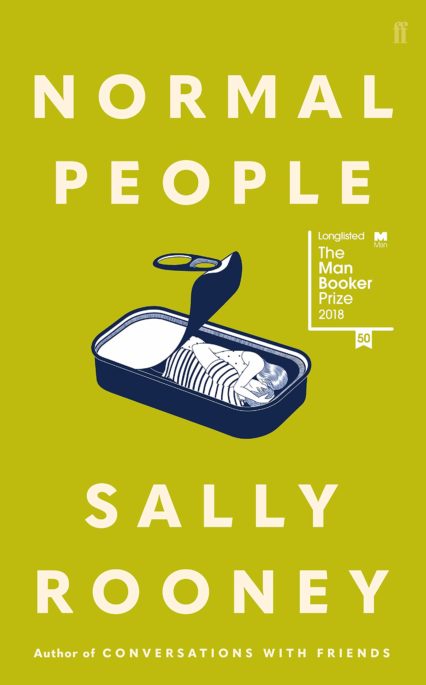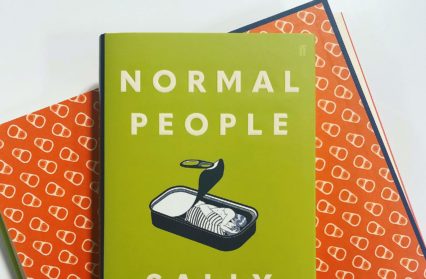John Lavin reviews Normal People, a romance novel by Sally Rooney which follows on from her previous novel Conversations with Friends.

‘It is one of the secrets in that change of mental poise which has been fitly named conversion, that too many among us neither heaven nor earth has any revelation till some personality touches theirs with a peculiar influence, subduing them into receptiveness.’
The above quote from Daniel Deronda serves as the epigraph to Normal People and there really couldn’t be a more appropriate description for the effect that the novel’s twin protagonists, Marianne and Connell, exert upon one another. Brought up in the small Irish town of Carricklea both have known each other since they were children, with Connell’s mother working as a cleaner for Marianne’s wealthy mother. In a novel that is keen to examine class structure, it is perhaps partly for this reason of wealth that Marianne is actively disliked and bullied at school, although it is probably mostly because she is opposed to the very notion of the school itself while being unapologetically intellectual and more than able to stand up to her teachers:
It seemed so obviously insane to her then that she should have to dress up in a costume every morning and be herded around a huge building all day, and that she wasn’t even allowed to move her eyes where she wanted, even her eye movements fell under the jurisdiction of school rules. You’re not learning if you’re staring out the window daydreaming, Mr Kerrigan said. Marianne, who had lost her temper by then, snapped back: Don’t delude yourself, I have nothing to learn from you.
School is very good to Connell: a popular, well-liked boy who just wants things to remain as they are. That he is drawn to Marianne suggests that this is not really the case, however, as his relationship with her will serve to irrevocably destabilise the structure of his life. On a subconscious level, it is perhaps for this reason that he insists that no one can find out that he and Marianne are friends, let alone that they are sleeping together, rather than for the surface level reason he gives, concerning their different popularity levels at school.
If Connell’s demand sounds not only deeply un-romantic but also disgustingly cruel and if therefore one of the two protagonists of Normal People appears to be a thoroughly horrible human being, then part of the contrary brilliance of the book is that – almost in spite of itself – it is a deeply romantic novel. If the Rooney aesthetic as a whole is built upon the telling of unfiltered revelations while describing people who will do anything and everything to hide their real feelings, then Connell is a classic example. Yes, he does behave like a horrible human being in the opening chapters, but nevertheless, he is ultimately a confused, kind-hearted, flawed and pleasingly complex character.
Sally Rooney’s Normal People is undeniably a considerably warmer, more passionate novel than Sally Rooney’s previous release Conversations with Friends, and in that sense, it feels like a more traditional work than its predecessor because on one level it is a romantic page-turner, albeit a decidedly twisted one. If the characters in that book seemed numb and heartless, all at sea in unchartered terrain, then this book is the same but with the heartlessness taken out and passion and intellect placed in its stead. These are characters to care about and theirs’ is a relationship the reader will find themselves rooting for, even if at the same time they will find themselves inordinately exasperated by some of their behaviour. But then that’s the point, of course: people are exasperating and inconsistent, people do behave like horrible human beings.
Plot asides, as with Conversations with Friends, Rooney’s brilliance lies in her exceptional aptitude for summarising and convincingly portraying the problems that face her generation. While so many other writers labour wearisomely to describe the impact of social media and technology, often failing horribly, Rooney writes about its impact on the lives of twentysomethings with matter-of-fact ease. And as with her debut novel, Rooney continues to write about sex in the 21st Century with a rare combination of honesty and accuracy that possesses genuine poetry few are capable of. Certainly, any white male English writer that likes to declaim that sex is an impossible subject to write about should read Rooney and hang their heads in redundant shame.
Rooney recognises the difficulties that her generation face as being to an extent, age-old problems cast in a different setting, and as such, in Normal People, she has been able to create a work of emotional weight that speaks for her own generation while simultaneously resonating across generations. Normal People is therefore a quite remarkable achievement and one that makes clear that Sally Rooney is one of the most vital new writers at work today.
Normal People is out now from Faber & Faber.
John Lavin is an avid contributor to Wales Arts Review.











